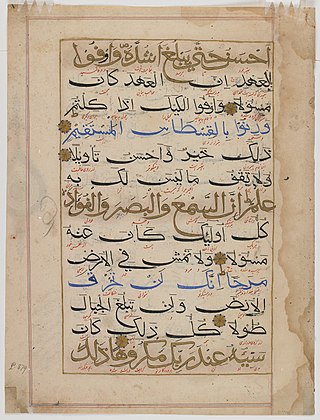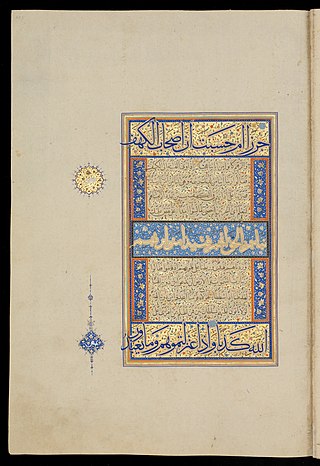Related Research Articles
A surah is an Arabic word meaning 'chapter' in the Quran. Its plural form is suwar.

Al-Isrāʾ, is the 17th chapter (sūrah) of the Quran, with 111 verses (āyāt). The word Isra' refers to the Night Journey of the Islamic prophet Muhammad. This surāh is part of a series al-Musabbihat surahs because it begins with the glorification of God.

Al-Fatiha is the first surah (chapter) of the Quran. It consists of 7 ayah (verses) which are a prayer for guidance and mercy. Al-Fatiha is recited in Muslim obligatory and voluntary prayers, known as salah. The primary literal meaning of the expression "Al-Fatiha" is "The Opener/The Key".
Al-ʻAlaq, is the 96th chapter (sūrah) of the Qur'an. It is composed of 19 āyāt or verses. It is sometimes also known as Sūrat Iqrā.

The Pen is the sixty-eighth chapter (sūrah) of the Qur'an with 52 verses (āyāt). Quran 68 describes God's justice and the judgment day. Three notable themes of this Surah are its response to the opponents' objections, warning and admonition to the disbelievers, and exhortation of patience to the Islamic prophet Muhammad. Chronologically, this was the first appearance of any of the "disjointed" [i.e., single] letters (muqattaat) which precede a number of the surahs of the Qur'an, while in Quranic order this is the last surah to have the appearance of muqattaat.
At-Tawbah is the ninth chapter of the Quran. It contains 129 verses and is one of the last Medinan surahs. This Surah is known by two names, At-Taubah and Al-Bara'at. It is called At-Taubah in light of the fact that it articulates taubah (atonement) and informs about the conditions of its acceptance.. The name Bara'at (Release) is taken from the opening word of the Surah.

Al-Anfal is the eighth chapter (sūrah) of the Quran, with 75 verses (āyāt). Regarding the timing and contextual background of the revelation, it is a "Medinan surah", completed after the Battle of Badr. It forms a pair with the next surah, At-Tawba.
An-Nisa' is the fourth chapter (sūrah) of the Quran, with 176 verses (āyāt). The title derives from the numerous references to women throughout the chapter, including verse 34 and verses 4:127-130.
Yunus, is the 10th chapter (surah) of the Quran with 109 verses (ayat). Yunus is named after the prophet Yunus (Jonah). According to tafsir chronology, it is believed to have been revealed before the migration of the Islamic prophet Muhammed and his followers from Mecca to Medina (Hijra), as such, it is known as a Meccan surah.

Al-Kahf is the 18th chapter (sūrah) of the Quran with 110 verses (āyāt). Regarding the timing and contextual background of the revelation, it is an earlier Meccan surah, which means it was revealed in Mecca, instead of Medina.
Ash-Shu‘ara’ is the 26th chapter (sūrah) of the Qurʾan with 227 verses (āyāt). Many of these verses are very short. The chapter is named from the word Ash-Shu'ara in ayat 224. It is also the longest Meccan surah according to the number of verses.

As-Sajdah (السجدة), is the 32nd chapter (sūrah) of the Quran with 30 verses (āyāt). The name of the chapter has been translated as ۩ 'prostration' or 'adoration' and is taken from the fifteenth verse, which mentions those who "... fall prostrate and hymn the praise of their Lord".

Al-Qamar is the 54th chapter (surah) of the Quran, with 55 verses (ayat).The Surah was revealed in Mecca. The opening verses refer to the splitting of the moon. "Qamar" (قمر), meaning "Moon" in Arabic, is also a common name among Muslims.

Al-Waqi'a is the 56th surah (chapter) of the Quran. Muslims believe it was revealed in Mecca, specifically around 7 years before the Hijrah (622), the migration of Muhammad to Medina. The total number of verses in this surah is 96. It mainly discusses the afterlife according to Islam, and the different fates people will face in it.
Al-Mujādilah is the 58th chapter (sūrah) of the Qur'an with 22 verses (ayat). Revealed in Medina, the chapter first addresses the legality of pre-Islamic method of divorce called zihar. The name "she who disputes" refers to the woman who petitioned Muhammad about the unjustness of this method, and the chapter's first verses outlaw it and prescribe how to deal with past cases of zihar. The chapter also discusses public assemblies and prescribes manners associated with it. The chapter ends by contrasting what it calls "the confederates of God" and "the confederates of Satan", and promising rewards for the former.

Al-Mumtaḥanah is the 60th chapter (sura) of the Quran, a Medinan sura with 13 verses.
Al-Muzzammil is the seventy-third chapter (sūrah) of the Qur'an, containing 20 verses (āyāt), which are recognized by Muslims as the word of God (Allah). The last Ruku of this surah contains only one ayāt making it possibly the smallest Ruku according to the number of verses or ayāt.
Al-Muṭaffifīn is the eighty-third surah of the Qur'an. It has 36 ayat or verses.
Aṭ-Ṭāriq, is the eighty-sixth sura of the Quran, with 17 ayat or verses. Muslims believe this chapter was sent to Muhammad when he was in Mecca.
References
Citations
- ↑ Wherry, Elwood Morris (1896). A Complete Index to Sale's Text, Preliminary Discourse, and Notes. London: Kegan Paul, Trench, Trubner, and Co.
 This article incorporates text from this source, which is in the public domain .
This article incorporates text from this source, which is in the public domain . - 1 2 3 The Study Quran, p. 1451.
- ↑ The Study Quran, p. 1453 commentary.
- ↑ The Study Quran, pp. 1450–1451.
- ↑ Translation of Sahih Bukhari (d.870), Volume 2, Book 13, Friday Prayer, Hadith Number 16 Archived 2017-06-10 at the Wayback Machine .
Bibliography
- Seyyed Hossein Nasr; Caner K. Dagli; Maria Massi Dakake; Joseph E.B. Lumbard; Mohammed Rustom, eds. (2015). The Study Quran: A New Translation and Commentary. New York, NY: HarperCollins. ISBN 978-0-06-112586-7.